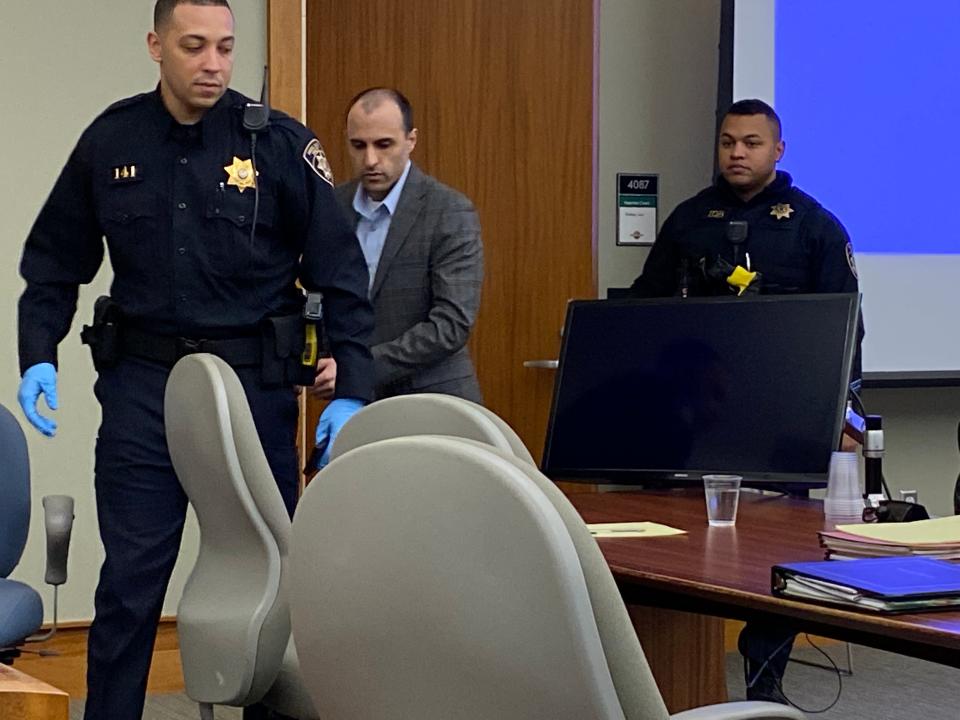Prosecution, defense agree: Soares not criminally responsible for park killing
WARWICK – A psychiatrist testifying for the prosecution on Friday came to the same conclusion as the psychiatrist who testified for the defense on Wednesday: A 37-year-old Pawtucket man who killed a Warwick retiree jogging in City Park in 2013 is schizophrenic and not criminally responsible for the killing.
Testifying Friday, Dr. Christopher Matkovic acknowledged that some aspects of Michael Soares' behavior showed an awareness of wrongfulness: his purchase of plane tickets to Pakistan in the wake of the killing, his attempt to conceal the body and his clumsy but successful effort to evade capture after the killing.
"Those were the clues that told me he had enough understanding of the ramifications of his behavior," Matkovic said. Even so, Matkovic said, Soares was delusional, not criminally responsible for his behavior and not able to comply with the law.

Soares is accused of bludgeoning to death John “Jack” Fay as the retired postal worker ran in the park on May 17, 2013.
Soares didn't regard Fay as someone who was human, said Matkovic.
Shortly after the killing, Soares encountered another person in the park without incident. Soares believed he had "released the energy" after the first attack, Matkovic said.
Soares told Matkovic he later took a flight to Washington, D.C., where he was scheduled to board another flight to Pakistan.
He was not allowed to board that flight to Islamabad, according to earlier testimony.
Soares attracted attention by officers of the Transportation Security Administration at both T.F. Green Airport in Warwick and Dulles International Airport in Virginia, said Warwick police Detective Sgt. Mark Canning.
Matkovic testified Friday that Soares had touched his beard repeatedly in the presence of the TSA officers. He had fidgeted and given evasive and vague answers to questions.
While these behaviors on Soares' part drew the officers' attention, they were not indicative of schizophrenia, Matkovic said.
Soares was not allowed to travel to Pakistan due to problems with his paperwork.
Matkovic said Soares told him he found his way back home from Virginia after a few days.
Soares remained at large for five years until 2019, when Warwick police investigators tracked him down. The breakthrough involved DNA that one of Soares' relatives had contributed to a database for geneological research.
Working with experts and DNA gathered from the scene, Warwick police were able to isolate Soares as a suspect. DNA analysis of a sample from him confirmed a match.
He was charged with first-degree murder. In court Friday, before Superior Court Judge Luis M. Matos, Soares' defense attorney, John J. Canham Jr., acknowledged that Soares killed Fay.
He argued Soares is not guilty by reason of insanity.
Earlier this week, Dr. Patricia Recupero, a witness for the defense, told Matos that Soares was schizophrenic.
Matkovic said he was aware of Recupero's determination. He also diagnosed Soares as schizophrenic but did not share her view on the degree to which the condition was "cyclical."
"This was an extremely challenging case for me," Matkovic said. He said he was troubled by some of his observations.
For example, Matkovic acknowledged his discomfort with some of Soares' statements about the legality of his behavior.
One statement, read by Assistant Attorney General Meghan E. McDonough, said "I knew it was illegal but I didn't feel it was morally improper."
Matkovic described some emails that Soares wrote in July of 2013 as strikingly "cool" and "collected" considering the subject matter.
He said he was troubled that as time passed and Soares' treatment for schizophrenia became more effective, he didn't turn himself in to authorities.
"I would hope someone would take accountability for what he had done," he said.
Matkovic described Soares as someone who can commit a crime that fits the legal standard for not guilty by reason of insanity and could also go on to commit another crime in the future. He cited this as a concern.
Soares has had dreams about killing his parents during his time at the Adult Correctional Institutions in Cranston, Matkovic said.
He told McDonough he believes Soares will need to live under heavy supervision, in a hospital setting, possibly for the rest of his life.
During closing arguments, Canham, Soares' defense attorney, emphasized that both psychiatrists found Soares not criminally responsible.
Assistant Attorney General Timothy G. Healey emphasized that in cases where a defendant pleads not guilty by reason of insanity, they carry the burden of proof.
He argued that both psychiatrists could rely only on Soares' statements – not, for example, on medical records – to determine Soares' state of mind when he killed Fay.
"I agree that's an issue, but what else could they rely on?" Matos said.
Healey argued that Soares' actions, such as his concealment of the body in the park and his attempt to leave the country, demonstrated an ability to comply with the law.
Matos said that he would consider the evidence and render a decision Jan. 27.
"It's a very complicated case," said Fay's daughter, Meaghan Fay, who lives in Los Angeles. "I'd rather he take his time and make the right decision."
This article originally appeared on The Providence Journal: Judge to decide park killing case and culpability of Michael Soares

